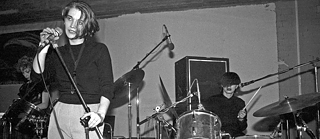SoundBites
Coal, Kebabs and Cold Water

Celebrated in English-speaking countries as a “Teutonic band”, the new wave group Malaria! never saw themselves as German – if anything, they were Berliner. Their underground hit Kaltes Klares Wasser, which enjoys cult, Kraftwerk-like status all over the world today, came about purely by chance. And thanks to feminist skills, has been given a second life.
In the 1980s, West Berlin was a grey, walled-in city of ruins. One that smelled of coal and kebabs. A city of pensioners and students, conscientious objectors and politniks, a city that had no curfews and parking tickets were rare. “Berlin was a forgotten island,” recalls Gudrun Gut, drummer of the band Malaria! in the 2021 book M_Dokumente. Malaria! formed there in 1981 following the dissolution of predecessor band Mania D. – the members contractually agreed to start all their music project names with the letter “M” – and toured all over the world. They performed with Siouxsie and the Banshees, New Order, the Slits, John Cale, and with Nina Hagen at Studio 54 in New York. Malaria! taught Nick Cave all about electronic music. It was only in Germany that no one showed any real interest in them – with the exception of Berlin’s pulsating underground scene, which didn’t feel German anyway.
The founding members Gudrun Gut and Bettina Köster lugged their own instruments around with them on their endless tours, spent their meagre earnings on telephone calls and froze in draughty old apartments, where the coal-fired ovens never really got going. It was at a moment like this that the idea for the song Kaltes Klares Wasser was born. Bettina Köster was lying in bed in her freezing cold flat, smoking a joint. It made her extremely thirsty, but she didn’t feel like getting up. The words “cold, clear water!” implanted themselves on her brain. As was usual for the punk, new wave and avant-garde-inspired band – Bettina and Gudrun both studied at the art academy – they tried out their songs on live audiences several times before recording them (if at all) on vinyl. This was also the case with Kaltes Klares Wasser, which they spontaneously recorded as a 12” single during two free days in Brussels, to scrape together enough money to pay for the hotel. The result was a dark wave track with a pummelling bass, driving drums and simultaneously apocalyptic and alluring lyrics about cool water. Today’s interpretation, which Robert Defcon recently wrote about on the occasion of the M_Dokumente exhibition at Berlin’s silent green, would undoubtedly have seemed absurd to the band at that time: “Malaria! fuse the cool, crypto-military man-machine style of contemporaries Kraftwerk with an oceanic feel and female physicality.”
„Cold clear water
Over my hands
Over my arms
Over my face“